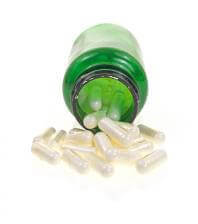What are the Benefits of Acidophilus?
Monica Reinagel, MS, LD/N, CNS

Answer. I’ll skip the lecture about taking nutrition advice from well-meaning friends. Acidophilus is just another name for probiotic bacteria. I talked about to the benefits of these “friendly” bacteria in one of my earlier podcasts. Although I’m sure there some good brands out there, buying acidophilus or other probiotic supplements is a bit of a crap shoot. Often, they don’t contain anywhere near the advertised amount of active bacteria and cross-contamination with undesirable bacteria is not uncommon. Expensive, refrigerated brands may be more reliable but are not immune to problems. They may be displayed in a refrigerated case at the grocer’s but how can you be sure they were kept cool during transport and storage? If you’re looking to add beneficial bacteria to your diet (which may or may not help your “sensitive stomach”), I suggest eating more cultured foods like yogurt, kefir, or fresh (not canned) sauerkraut instead. You can also buy “acidophilus milk,” which is sort of half-way between milk and yogurt, at many health food stores.
Related content: Do you need a probiotic supplement?
Acidophilus Pills image courtesy of Shutterstock

